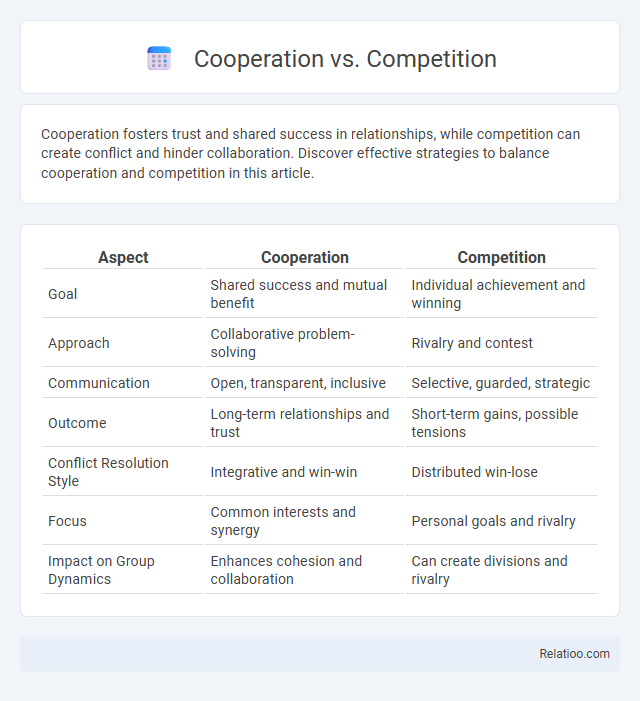Cooperation fosters trust and shared success in relationships, while competition can create conflict and hinder collaboration. Discover effective strategies to balance cooperation and competition in this article.
Table of Comparison
| Aspect | Cooperation | Competition |
|---|---|---|
| Goal | Shared success and mutual benefit | Individual achievement and winning |
| Approach | Collaborative problem-solving | Rivalry and contest |
| Communication | Open, transparent, inclusive | Selective, guarded, strategic |
| Outcome | Long-term relationships and trust | Short-term gains, possible tensions |
| Conflict Resolution Style | Integrative and win-win | Distributed win-lose |
| Focus | Common interests and synergy | Personal goals and rivalry |
| Impact on Group Dynamics | Enhances cohesion and collaboration | Can create divisions and rivalry |
Understanding Cooperation and Competition
Understanding cooperation involves recognizing its focus on shared goals, mutual benefits, and collaborative problem-solving, which fosters trust and long-term relationships. Competition centers on outperforming others to achieve individual success, often driving innovation and efficiency but sometimes at the expense of collaboration. Your ability to balance cooperation and competition can enhance teamwork, boost productivity, and create a dynamic environment for growth.
Key Differences Between Cooperation and Competition
Cooperation involves individuals or groups working collaboratively toward a common goal, emphasizing shared success and resource pooling, while competition centers on individuals or groups striving to outperform each other for limited rewards or recognition. Key differences include the nature of interaction, where cooperation fosters mutual benefit and knowledge exchange, and competition drives innovation and personal achievement through rivalry. Understanding these distinctions is crucial for applying the appropriate strategy in organizational, educational, or social contexts to optimize performance and relationships.
Benefits of Cooperative Approaches
Cooperative approaches foster shared goals, enhancing innovation and problem-solving through diverse perspectives and collective expertise. Your organization can benefit from increased trust, stronger relationships, and resource optimization, which lead to sustainable success and resilience in complex environments. Emphasizing cooperation over competition encourages collaboration that drives long-term value for all stakeholders involved.
Advantages of Competitive Strategies
Competitive strategies drive innovation by encouraging businesses to develop unique products and services that meet customer needs more effectively. They enhance market efficiency through price competition, benefiting consumers with better value and choice. Strong competition also motivates companies to improve operational performance and cost management, leading to sustainable growth.
Psychological Impacts of Cooperation and Competition
Cooperation fosters positive psychological impacts such as increased trust, empathy, and social bonding, leading to enhanced group cohesion and motivation. Competition, while driving individual achievement and performance, can elevate stress levels, anxiety, and feelings of isolation or rivalry among participants. Balancing cooperation and competition optimizes psychological well-being by promoting healthy challenges alongside collaborative support.
Cooperation vs Competition in the Workplace
Cooperation in the workplace fosters teamwork, enhances communication, and drives collective problem-solving, resulting in higher productivity and employee satisfaction. Competition, while motivating individual performance and innovation, can lead to stress, reduced collaboration, and a fragmented work environment. Balancing cooperation and competition involves leveraging the benefits of both by encouraging shared goals alongside healthy rivalry to optimize organizational success.
Effects on Innovation and Productivity
Cooperation drives innovation and productivity by fostering knowledge sharing, diverse perspectives, and collaborative problem-solving that accelerate breakthroughs and efficiency. Competition encourages individuals and organizations to push boundaries, improve quality, and optimize processes, often resulting in rapid advancements and increased productivity. Your business thrives when strategically balancing cooperation's collaborative strengths with competition's motivational pressures, ultimately enhancing innovation outcomes and operational performance.
When to Choose Cooperation Over Competition
Choosing cooperation over competition is essential when long-term collaboration fosters greater innovation, resource sharing, and mutual growth. In scenarios where shared goals align and collective expertise enhances problem-solving, cooperation maximizes value and strengthens relationships. Industries driven by complex challenges, like technology and healthcare, benefit most from cooperative strategies that leverage diverse strengths and promote sustainable success.
Balancing Cooperation and Competition for Success
Balancing cooperation and competition is key to driving innovation and achieving long-term success in dynamic environments. Your ability to foster teamwork while encouraging healthy competition enhances productivity, motivation, and creative problem-solving. Integrating collaboration with competitive strategies helps organizations adapt, grow, and maintain a competitive edge.
Future Trends in Cooperation and Competition
Future trends in cooperation and competition emphasize the integration of collaborative innovation with strategic rivalry, fostering ecosystems where businesses co-develop technologies while competing in global markets. Digital transformation and AI-driven analytics enable real-time data sharing and competitive intelligence, increasing agility and informed decision-making. Emerging models like coopetition blend cooperation with competition, accelerating growth and resilience in dynamic industries such as technology, biotechnology, and renewable energy.

Infographic: Cooperation vs Competition
 relatioo.com
relatioo.com